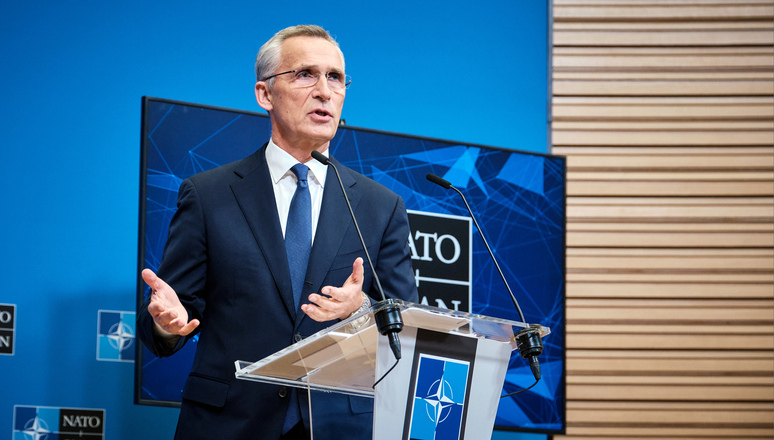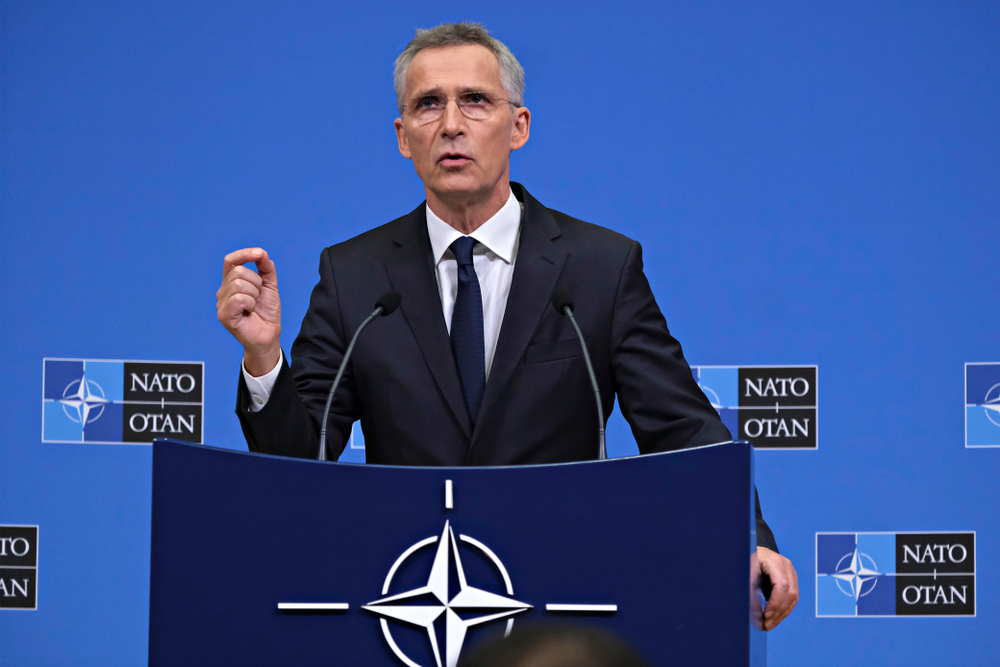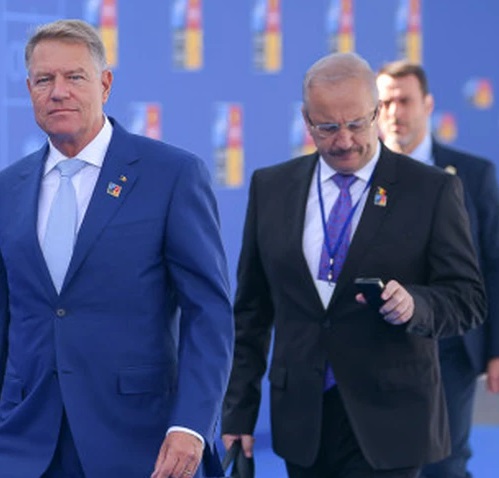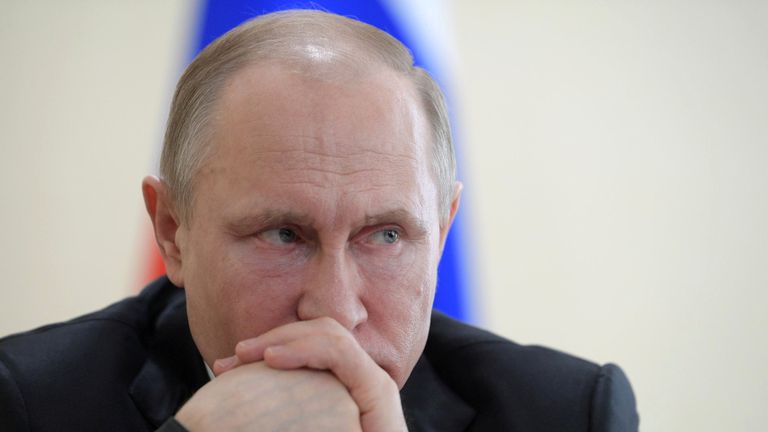Orice atac asupra infrastructurii critice a NATO va primi un “răspuns unit şi ferm”, a avertizat marţi Secretarul General al Alianţei Nord-Atlantice, Jens Stoltenberg, potrivit Reuters şi DPA.
Aliaţii din NATO îşi sporesc securitatea în jurul instalaţiilor esenţiale după atacurile asupra gazoductelor din Marea Baltică, a spus Stoltenberg într-o conferinţă de presă.
Încă nu este clar cine s-a aflat în spatele exploziilor de la gazoductele Nord Stream.

Comentând ameninţările voalate cu utilizarea armelor nucleare ale preşedintelui rus Vladimir Putin, Stoltenberg a declarat că Alianţa Nord-Atlantică monitorizează cu atenţie forţele nucleare ale Rusiei şi nu a observat schimbări în poziţia lor, dar rămâne “vigilentă”.
El a confirmat totodată că NATO va organiza săptămâna viitoare exerciţiul său anual de descurajare nucleară, ‘Steadfast Noon’, aşa cum era prevăzut.
“Este un exerciţiu de rutină care are loc în fiecare an pentru a ne menţine capacitatea de descurajare eficientă şi în siguranţă”, a explicat şeful NATO.
“Rusia ştie că un război nuclear nu poate fi câştigat şi nu trebuie niciodată purtat”, a mai afirmat el.
Stoltenberg a declarat de asemenea că Ucraina a câştigat teren în războiul cu Rusia şi că NATO va fi alături de Kiev atât timp cât e nevoie.
“În timp ce Rusia apelează tot mai mult la atacuri îngrozitoare şi nediscriminate asupra civililor şi infrastructurii critice, preşedintele Putin eşuează în Ucraina”, a spus Stoltenberg, cu o zi înaintea unei reuniuni a miniştrilor Apărării din NATO la Bruxelles.
NATO este în discuţii cu companii de apărare şi cu statele membre pentru a-şi consolida producţia de arme şi a-şi completa stocurile care au fost golite de livrările de materiale militare către Ucraina, a mai subliniat el.
Stoltenberg a precizat că reuniunea miniştrilor Apărării din NATO din această săptămână va analiza eforturile necesare pentru creşterea producţiei de arme şi muniţie şi va adopta decizii suplimentare pentru a menţine nivelurile stocurilor statelor membre.
“Dar, bineînţeles, cu cât războiul din Ucraina va continua, cu atât această colaborare cu industria va fi tot mai importantă”, a spus el, adăugând că NATO va trebui să transmită companiilor de apărare care este necesarul său, scrie Agerpres.
#NATO Sec Gen remarks :
NATO Defence Ministers will meet this week at an important moment for transatlantic security.
We will review our progress on strengthening NATO’s deterrence and defence.
We will further increase the protection of our critical infrastructure, in light of the sabotage of the Nord Stream pipelines.
And we will step up and sustain our support for Ukraine.
So that they can continue, so they can continue to defend themselves, and liberate territory from Russian occupation.
Ukraine has the momentum.
And continues to make significant gains.
While Russia is increasingly resorting to horrific and indiscriminate attacks on civilians and critical infrastructure.
President Putin is failing in Ukraine.
His attempted annexations, partial mobilisation, and reckless nuclear rhetoric represent the most significant escalation since the start of the war.
And they show that this war is not going as planned.
NATO is not party to the conflict.
But our support is playing a key role.
Allies remain united in their support for Ukraine’s sovereignty and self-defence.
Ukraine’s Defence Minister, Oleksii Reznikov, will join us tomorrow.
Both for the US-led Contact Group for Ukraine and for a dinner with NATO Ministers.
Together, we will address Ukraine’s urgent needs.
I welcome the recent announcements by Allies to provide more advanced air defence systems and other capabilities to Ukraine.
And I look forward to further deliveries.
Our message is clear.
NATO stands with Ukraine.
For as long as it takes.
President Putin started this war.
He must end it.
By withdrawing his forces from Ukraine.
And President Lukashenko should stop the complicity of Belarus in this illegal conflict.
On Thursday, I will chair a regular meeting of the Nuclear Planning Group.
The fundamental purpose of NATO’s nuclear deterrence has always been to preserve peace, prevent coercion and deter aggression.
Next week, NATO will hold its long-planned deterrence exercise,
Steadfast Noon.
This is routine training, which happens every year.
To keep our deterrent safe, secure and effective.
President Putin’s veiled nuclear threats are dangerous and irresponsible.
Russia knows that a nuclear war cannot be won and must never be fought.
We are closely monitoring Russia’s nuclear forces.
We have not seen any changes in Russia’s posture.
But we remain vigilant.
At the Madrid Summit in June, NATO leaders decided a fundamental shift in our defence and deterrence to respond to the new security reality.
We have doubled the number of NATO battlegroups in the east of the Alliance.
They can be scaled up quickly to brigade size.
We are also increasing the number of our high readiness forces.
At this ministerial, we will take decisions to increase our stockpiles of munitions and equipment.
To speed up the delivery of capabilities.
And to use the NATO Defence Planning Process to provide industry with the long-term demand they need to boost production.
We will also address the protection of our critical infrastructure.
NATO has been working on this for many years.
And following the sabotage of the Nord Stream pipelines, we have further enhanced our vigilance across all domains.
We have doubled our presence in the Baltic and North Seas.
To over 30 ships.
Supported by maritime patrol aircraft and undersea capabilities.
These efforts are closely coordinated by NATO’s Maritime Command.
Allies are also increasing security around key installations.
And stepping up intelligence and intelligence sharing.
We will take further steps to strengthen our resilience and protect our critical infrastructure.
Any deliberate attack against Allies’ critical infrastructure would be met with a united and determined response.
Our final session will focus on NATO’s missions and operations.
From Kosovo to Iraq.
We will be joined by EU High Representative Borrell.
Because NATO and the European Union face the same security challenges.
We have a difficult winter ahead.
So it is even more important that North America and Europe continue to stand united.
In support for Ukraine.
And in defence of our people.





